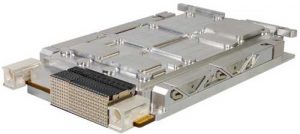Mercury Systems: TRRUST-Stor VPX RT Space-Qualified Secure SSDs
Leveraging VITA 78 SpaceVPX standards, qualified for two suppliers of Low Earth Orbit satellites
This is a Press Release edited by StorageNewsletter.com on February 1, 2019 at 2:39 pmMercury Systems, Inc. announced the first prototype shipments of its 3U TRRUST-Stor VPX RT space-qualified secure SSDs to two suppliers of Low Earth orbit (LEO) satellites.
Designed to operate reliably in high radiation environments, this device is a commercial SSD leveraging VITA 78 SpaceVPX standards to reduce customer cost and mitigate program risk. In addition to commercial satellite applications, this device is suited for high-altitude aircraft, airborne weapons and mission-critical ground computing systems.
It’s the first commercial SSD to leverage VITA 78 SpaceVPX standards.
“Customer demand for commercial radiation-tolerant SSD devices for LEO satellites has far surpassed our expectations as we continue to gain share in this dynamic market,” said Iain Mackie, VP and GM, microelectronics secure solutions group, Mercury. “I am immensely proud of the employees of our Phoenix Advanced Microelectronics Center who have successfully demonstrated that Mercury’s innovative next-generation business model unlocks value for satellite designers and manufacturers around the globe.“
At the heart of the SSD is the firm’s proprietary NAND controller with BuiltSECURE ECC algorithms. They mitigate radiation-induced byte errors, thereby enabling sustainable reliability and fault tolerance that are not available with competing storage solutions. As the company maintains 100% authority over the controller and its implementation, this device is readily customizable for non-traditional use cases when deemed critical to a customer’s program.
Honored with a Platinum award in the category of trusted Ccomputing in the 2018 Military and Aerospace Electronics Innovators Awards program,
TRRUST-Stor VPX RT device provides long-term data integrity. Engineered into an open standards platform, customers can integrate this device into the SpaceVPX ecosystem of processing board and chassis without sacrificing affordability. As the need for radiation-tolerant devices for LEO satellites proliferates, system development around the SpaceVPX open standard architecture will be integral in supporting the growth of the space market.
The company’s dedication to all aspects of industrial security extends beyond product design and into the cadence of its daily operations. The firm’s portfolio of digital microelectronic solutions are designed and manufactured in a Defense Microelectronics Activity (DMEA) – accredited facility for design, packaging, test and broker services. Several of the firm’s facilities have been recognized for excellence by receiving a superior rating from the Defense Security Service (DSS).
Flight units are scheduled to ship in 1H19.














 Subscribe to our free daily newsletter
Subscribe to our free daily newsletter


